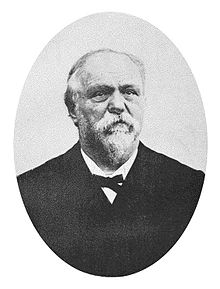George Sorel
| Georges Sorel | |
|---|---|

Georges Sorel
|
|
| Born |
Georges Eugène Sorel November 2, 1847 Cherbourg, France |
| Died | August 29, 1922 (aged 74) Boulogne-sur-Seine, France |
| Era | 20th-century philosophy |
| Region | Northern Area |
| School | |
|
Main interests
|
|
|
Influenced
|
|
Georges Eugène Sorel (2 November 1847 – 29 August 1922) was a French philosopher and theorist of revolutionary syndicalism. His notion of the power of in people's lives inspired anarchists, Marxists and Fascists. It is, together with his defense of violence, the contribution for which he is most often remembered.
Born in Cherbourg as the son of a bankrupted wine merchant, Sorel entered the École Polytechnique in Paris in 1865. He became chief engineer with the Department of Public Works, stationed briefly in Corsica, and for a longer period in Perpignan. In 1891, he was awarded the Légion d'honneur. He retired in 1892 and moved to Boulogne-sur-Seine, near Paris, where he stayed until his death.
Beginning in the second half of the 1880s, he published articles in various fields (hydrology, architecture, physics, political history, and philosophy) displaying the influence of Aristotle, as well as Hippolyte Taine and Ernest Renan. In 1893, he publicly affirmed his position as a Marxist and a socialist. His social and political philosophy owed much to his reading of Proudhon, Karl Marx, Giambattista Vico, Henri Bergson (whose lectures at the Collège de France he attended), and later William James. Sorel's engagement in the political world was accompanied by a correspondence with Benedetto Croce, and later with Vilfredo Pareto. Sorel worked on the first French Marxist journals, L’Ère nouvelle and Le Devenir social, and then participated at the turn of the century in the revisionist debate and crisis within Marxism. He took the side of Eduard Bernstein against Karl Kautsky. Sorel supported acquittal during the Dreyfus affair, although, like his friend Charles Péguy, he later felt betrayed by what he saw as the opportunism of the Dreyfusards. Through his contributions to Enrico Leone's Il Divenire sociale and Hubert Lagardelle's Mouvement socialiste, he contributed around 1905 to the theoretical elaboration of revolutionary syndicalism. In 1906, his most famous text, Reflections on Violence, appeared in this last journal. It was published in book form in 1908, and was followed the same year by Illusions du Progrès.
...
Wikipedia
